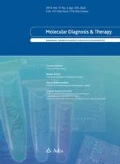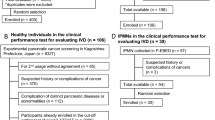Abstract
Background: α-Methylacyl-coenzyme-A racemase (AMACR) has been shown to be a highly specific marker for prostate cancer cells, even in the earliest stages of malignant progression. It is expressed at much higher levels than prostate-specific antigen (PSA) in malignant tissues, and is not expressed at appreciable levels in normal prostatic epithelium. In this study, we demonstrate the quantitative detection of AMACR transcripts in peripheral blood of prostate cancer patients using real-time RT-PCR. In addition, we have undertaken a pilot study to demonstrate the potential application of this technique for the detection of prostate tumor cells in urine samples from patients with prostate cancer.
Methods: A real-time RT-PCR assay was developed for detection of the expression of AMACR in prostate cancer patients. Blood samples from 163 patients were tested at various stages of disease progression, with or without therapy. Blood specimens from patients with benign prostate disorders and other types of cancer were also evaluated.
Results: In 28 of 58 samples from patients with known metastatic disease who were undergoing treatment, an AMACR expression signal above the cut-off value was detected, consistent with the presence of circulating tumor cells. In 39 of 88 patients with presumptive organ-confined disease, there was evidence of low levels of circulating tumor cells. Comparison of AMACR RT-PCR with known serum PSA values indicated that a combination of these parameters significantly increased the sensitivity for detection of progressive disease. In a pilot study analyzing urine samples from seven prostate cancer patients, elevated AMACR expression levels were detected in the urine sediments of four of six stage-T1 prostate cancer patients and in the one patient with stage-T2 prostate cancer.
Conclusion: The data presented in this study indicates that AMACR real-time RT-PCR may aid in the detection and staging of prostate cancer.




Similar content being viewed by others
References
Braun S, Pantel K, Muller P, et al. Cytokeratin-positive cells in the bone marrow and survival of patients with stage I, II, or III breast cancer. N Engl J Med 2000; 342: 525–33
Cristofanilli M, Budd GT, Ellis MJ, et al. Circulating tumor cells, disease progression, and survival in metastatic breast cancer. N Engl J Med 2004; 351: 781–97
Zehentner B. Detection of disseminated tumor cells: strategies and diagnostic implications. Expert Rev Mol Diagn 2002; 2: 41–8
Cama C, Olsson CA, Buttyan R, et al. Molecular staging of prostate cancer: III. Effects of cystoscopy and needle biopsy on the enhanced reverse transcriptase polymerase chain reaction assay. J Urol 1997; 157: 1748–51
Cama C, Olsson CA, Raffo AJ, et al. Molecular staging of prostate cancer: II. A comparison of the application of an enhanced reverse transcriptase polymerase chain reaction assay for prostate specific antigen versus prostate specific membrane antigen. J Urol 1995; 153: 1373–8
Laribi A, Berteau P, Gala J, et al. Blood-borne RT-PCR assay for prostasin-specific transcripts to identify circulating prostate cells in cancer patients. Eur Urol 2001; 39: 65–71
Shariat SF, Gottenger E, Nguyen C, et al. Preoperative blood reverse transcriptase-PCR assays for prostate-specific antigen and human glandular kallikrein for prediction of prostate cancer progression after radical prostatectomy. Cancer Res 2002; 62: 5974–9
Loric S, Dumas F, Eschwege P, et al. Enhanced detection of hematogenous circulating prostatic cells in patients with prostate adenocarcinoma by using nested reverse transcription polymerase chain reaction assay based on prostate-specific membrane antigen. Clin Chem 1995; 41: 1698–704
Katz AE, Olsson CA, Raffo AJ, et al. Molecular staging of prostate cancer with the use of an enhanced reverse transcriptase-PCR assay. Urology 1994; 43: 765–75
sciden MV, Kantoff PW, Krithivas K, et al. Detection of circulating tumor cells in men with localized prostate cancer. J Clin Oncol 1994; 12: 2634–9
Tombal B, Van Cangh PJ, Loric S, et al. Prognostic value of circulating prostate cells in patients with a rising PSA after radical prostatectomy. Prostate 2003; 56: 163–70
Israeli RS, Miller WH, Su SL, et al. Sensitive nested reverse transcription polymerase chain reaction detection of circulating prostatic tumor cells: comparison of prostate-specific membrane antigen and prostate-specific antigen-based assays. Cancer Res 1994; 54: 6306–10
Hara N, Kasahara T, Kawasaki T, et al. Reverse transcription-polymerase chain reaction detection of prostate-specific antigen, prostate-specific membrane antigen, and prostate stem cell antigen in one milliliter of peripheral blood: value for the staging of prostate cancer. Clin Cancer Res 2002; 8: 1794–9
Gewanter RM, Katz AE, Olsson CA, et al. RT-PCR for PSA as a prognostic factor for patients with clinically localized prostate cancer treated with radiotherapy. Urology 2003; 61: 967–71
Ylikoski A, Pettersson K, Nurmi J, et al. Simultaneous quantification of prostate specific antigen and human glandular kallikrein 2 mRNA in blood samples from patients with prostate cancer and benign disease. Clin Chem 2002; 48: 1265–71
Kantoff PW, Halabi S, Farmer DA, et al. Prognostic significance of reverse transcriptase polymerase chain reaction for prostate-specific antigen in men with hormone-refractory prostate cancer. J Clin Oncol 2001; 19: 3025–8
Halabi S, Small EJ, Hayes DF, et al. Prognostic significance of reverse transcriptase polymerase chain reaction for prostate specific antigen in metastatic prostate cancer: a nested study within CALGB 9583. J Clin Oncol 2003; 21: 490–5
Sokoloff M, Tso C, Kaboo R, et al. Quantitative polymerase chain reaction does not improve preoperative prostate cancer staging: a clinicopathological molecular analysis of 121 patients. J Urol 1996; 156: 1560–6
Smith M, Biggar S, Hussain M. Prostate specific antigen messenger RNA is expressed in non-prostate cells: implications for detection of micrometastases. Cancer Res 1995; 55: 2640–4
Ghossein RA, Bhattacharya S. Molecular detection and characterization of circulating tumor cells and micrometastases in prostatic, urothelial, and renal cell carcinomas. Semin Surg Oncol 2001; 20: 304–11
Aslanzadeh J. Preventing PCR amplification carryover contamination in a clinical laboratory. Ann Clin Lab sci 2004; 34: 389–96
Jiang Z, Woda BA, Rock KL, et al. P504S: a new molecular marker for the detection of prostate carcinoma. Am J Surg Pathol 2001; 25: 1397–404
Rubin M, Zhou M, Dhanasekaran S, et al. α-Methylacyl coenzyme A racemase as a tissue biomarker for prostate cancer. JAMA 2002; 287: 1662–70
Xu J, Kalos M, Stolk JA, et al. Identification and characterization of prostein, a novel prostate-specific protein. Cancer Res 2001; 61: 1563–8
Beach R, Gown AM, De Peralta-Venturina MN, et al. P504S immunohistochemical detection in 405 prostatic specimens including 376 18-gauge needle biopsies. Am J Surg Pathol 2002; 26: 1588–96
Walsh PC. α-Methylacyl-CoA racemase: a new molecular marker for prostate cancer. J Urol 2002; 168: 1635
Jiang Z, Woda BA, Yang XJ. cc-Methylacyl coenzyme A racemase as a marker for prostate cancer. JAMA 2002; 287: 3080–1
Yang X, Wu C, Woda B, et al. Expression of α-Methylacyl-CoA racemase (P504S) in atypical adenomatous hyperplasia of the prostate. Am J Surg Pathol 2002; 26: 921–95
Jiang Z, Wu C, Woda B, et al. P504S/α-methylacyl-CoA racemase: a useful marker for diagnosis of small foci of prostatic carcinoma on needle biopsy. Am J Surg Pathol 2002; 26: 1169–74
Kuefer R, Varambally S, Zhou M, et al. α-Methylacyl-CoA racemase: expression levels of this novel cancer biomarker depend on tumor differentiation. Am J Pathol 2002; 161: 841–8
Luo J, Zha S, Gage W, et al. α-methylacyl-CoA racemase: a new molecular marker for prostate cancer. Cancer Res 2002; 62: 2220–6
Farinola MA, Epstein JI. Utility of immunohistochemistry for α-methylacyl-CoA racemase in distinguishing atrophic prostate cancer from benign atrophy. Hum Pathol 2004; 35: 1272–8
Jiang Z, Fanger GR, Woda BA, et al. Expression of α-methylacyl-CoA racemase (P504s) in various malignant neoplasms and normal tissues: a study of 761 cases. Hum Pathol 2003; 34: 792–6
Cuebas D, Phillips C, Schmitz W, et al. The role of α-methylacyl-CoA racemase in bile acid synthesis. Biochem J 2002; 363: 801–7
Ferdinandusse S, Denis S, IJlst L, et al. Subcellular localization and physiological role of α-methylacyl-CoA racemase. J Lipid Res 2000; 41: 1890–6
Western Institutional Review Board [online]. Available from URL: http://www.wirb.com [Accessed 2006 Nov 14]
AmericasDoctor [online]. Available from URL: http://www.americasdoctor.com [Accessed 2006 Nov 22]
Herrala AM, Porvari K, Kyllonen AP, et al. Comparison of human prostate specific glandular kallikrein 2 and prostate specific antigen gene expression in prostate with gene amplification and overexpression of prostate specific glandular kallikrein 2 in tumor tissue. Cancer 2001; 92: 2975–84
Ross JS, Sheehan C, Fisher HA, et al. Correlation of primary tumor prostate-specific membrane antigen expression with disease recurrence in prostate cancer. Clin Cancer Res 2003; 9: 6357–62
Moreno JG, O’Hara SM, Gross S, et al. Changes in circulating carcinoma cells in patients with metastatic prostate cancer correlate with disease status. Urology 2001; 58: 386–92
Gelmini S, Tricacico C, Vona G, et al. Real time quantitative reverse transcriptase-polymerase chain reaction (RT-PCR) for the measurement of prostate specific antigen mRNA in the peripheral blood of patients with prostate carcinoma using the TaqMan detection system. Clin Chem Lab Med 2001; 39: 385–91
Gao C, Rawal S, Sun L, et al. Diagnostic potential of prostate specific antigen expressing epithelial cells in blood of prostate cancer patients. Clinical Cancer Res 2003; 9: 2545–50
Nassar A, Amin MB, Sexton DG, et al. Utility of α-methylacyl coenzyme A racemase (p504s antibody) as a diagnostic immunohistochemical marker for cancer. Appl Immunohistochem Mol Morphol 2005; 13(3): 252–5
Witkiewicz AK, Varambally S, Shen R, et al. α-Methylacyl-CoA racemase protein expression is associated with the degree of differentiation in breast cancer using quantitative image analysis. Cancer Epidemiol Biomarkers Prev 2005; 14(6): 1418–23
Shimazui T, Yoshikawa K, Uemura H, et al. The level of cadherin-6 mRNA in peripheral blood is associated with the site of metastasis and with the subsequent occurrence of métastases in renal cell carcinoma. Cancer 2004; 101: 963–8
Jotsuka T, Okumura Y, Nakano S, et al. Persistent evidence of circulating tumor cells detected by means of RT-PCR for CEA mRNA predicts early relapse: a prospective study in node-negative breast cancer. Surgery 2004; 135: 419–26
Reynolds SR, Albrecht J, Shapiro RL, et al. Changes in the presence of multiple markers of circulating melanoma cells correlate with clinical outcome in patients with melanoma. Clin Cancer Res 2003; 9: 1497–502
Ashida S, Nakagawa H, Katagiri T, et al. Molecular features of the transition from prostatic intraepithelial neoplasia (PIN) to prostate cancer: genome-wide gene-expression profiles of prostate cancers and PINs. Cancer Res 2004; 64: 5963–72
Zielie PJ, Mobley J, Ebb RG, et al. A novel diagnostic test for prostate cancer emerges from the determination of α-methylacyl-coenzyme a racemase in prostatic secretions. J Urol 2004; 172: 1130–3
Acknowledgments
We would like to thank Drs Mark Kiviat, Gary Goodman, Richard Osten-son, and Steve Loop for providing blood samples from prostate cancer patients and individuals with other urological disorders. We would also like to thank Andrew Lin for his assistance in facilitating sample and data transfer. This work was supported in part by grant R44 CA-80518 from the National Cancer Institute. The authors have no conflicts of interest that are directly relevant to the content of this study.
Author information
Authors and Affiliations
Corresponding author
Rights and permissions
About this article
Cite this article
Zehentner, B. ., Secrist, H., Zhang, X. et al. Detection of α-Methylacyl-Coenzyme-A Racemase Transcripts in Blood and Urine Samples of Prostate Cancer Patients. Mol Diag Ther 10, 397–403 (2006). https://doi.org/10.1007/BF03256217
Published:
Issue Date:
DOI: https://doi.org/10.1007/BF03256217




